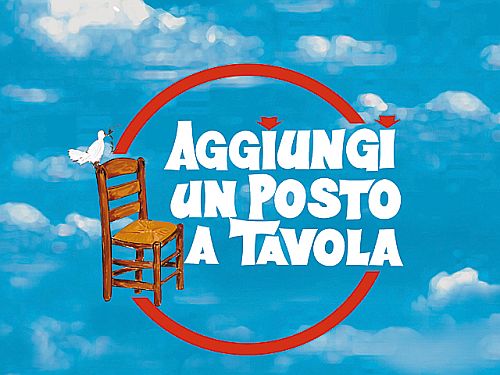All posts by Deirdre Straughan
Aggiungi un Posto a Tavola: Peccato Che Sia Peccato
It’s a Shame That It’s a Sin
This song, the second in the show, is built around a pun. Peccato means “sin,” but the phrase Che peccato is used like the English “What a shame!”
The singers are Don Silvestro, the priest, and Clementina, the mayor’s daughter, who has a crush on him (which he, secretly, reciprocates) and goes daily to confess sins that she hasn’t actually committed, just to have an excuse to talk to him.
Continue reading Aggiungi un Posto a Tavola: Peccato Che Sia PeccatoAggiungi un Posto a Tavola: Buttalo Via
Aggiungi un Posto a Tavola – An Italian Musical
Add Another Place at the Table
I’m a huge fan of musical theater, grew up singing along with The Music Man, Camelot and Oliver. The first show I saw on stage was You’re A Good Man, Charlie Brown, in what must have been a local or travelling production, in San Francisco, when we were on home leave in 1969. I knew all these shows by heart, and by now know (and have seen) many more – most recently, Spamalot.
Continue reading Aggiungi un Posto a Tavola – An Italian MusicalThings I’ve Found Online Worth Sharing
I am subscribed to about 125 blogs at the moment. (Must cut that down.) Many are for work: blogs about “new” television and “new” media, broadband, Internet, Web 2.0, general tech news, etc. Then there are a bunch which apply my work but I’d read anyway: on design, customer service, marketing, user interaction, usability, how to run a happy business. One of my favorites in this (or any) category is Creating Passionate Users. Kathy Sierra is my hero – I hope I get to meet her someday.
Some I read just for fun and for useful tips.
Some I read to learn about different cultures, such as Adventures of a Lipstick Wahhabi – written not nearly often enough by a young woman in Saudi Arabia. I don’t understand half of what she writes in Roman letters (let alone the portions in Arabic), but it’s a fascinating glimpse into a world I’d like to know more about. I found her via Hilaliya, a TCK Kuwaiti whom I discovered because he linked to my TCK pages, and through him I’ve found a community sharing their lives in the Middle East via blogs.
Then there are the blogs I read to learn how different minds see the world.
When I want to shake my head sadly over the state of the world (which is quite often, lately), I go to Richard Dawkins’ site for links to articles about the world’s excesses in the name of religion.
I’m adding more and more Italian blogs to my list. I define as “Italian” blogsby Italians in Italian or in English (some use both), and blogs by foreigners inItaly.
Then there are blogs that advise me on how to make a living from blogging.
Recently I’ve started reading some very dangerous cooking blogs.
I don’t read all of these every day (even those that publish daily or even more often). One I do read as soon it’s published is Scott Adams’ Dilbert Blog. Adams is the author of the Dilbert cartoon (beloved by geeks like me, among others), but his blog is also consistently funny and/or thought-provoking. His mind doesn’t seem to work quite like most people’s, including most of his readers.
Sites
Steve van Rooy, a Woodstock alum (class of ’68) has started his own website with fascinating tales of growing up as a missionary kid in India and at Woodstock. Well-written and highly recommended!
Videos
Galacticast – A weekly videoblog of sci-fi spoofs and more – great fun!
A charmingly-animated take on the Ramayana, the classic Indian epic, from the point of view of Sita, the long-suffering heroine.





